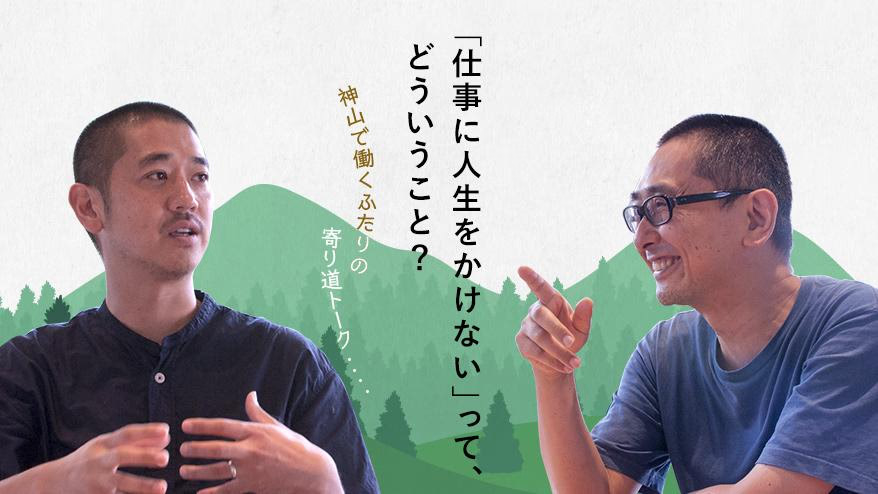ある日、西村佳哲さんより、同じ徳島県神山町で働いている真鍋(神山フードハブ・プロジェクト※1支配人 兼 モノサス部長)へ、「ちょっと聞いてみたいことがある」とお声がけいただきました。
それから数日後、朝7時より神山町のかま屋※2で行われた対談で、西村さんから発せられた真鍋への問いは、「仕事を支えるエネルギーはどこから得ているの?」といったもの。
「社会的農業」「社会的/会社的」「べてるの家の向谷地生良さん」「ソーシャルワーカー」「ネガティブ/ポジティブ」などの言葉が飛び交う中、向谷地さんの「仕事に人生をかけない」という言葉から、「ではわたしたちの仕事を支えるエネルギーって何だろう?」という問いが生まれました。
同じ町で働くふたりが、自分たちの仕事を支えるエネルギーについて、行きつ戻りつ、そのとき考えながら話したことをお伝えします。(対談構成:中庭佳子)
※1 神山フードハブ・プロジェクト:神山のワーキンググループが発端で立ち上がった、神山町役場、神山 つなぐ公社、㈱モノサスが共同で立ち上げた、神山の農業を次世代につなぐためのプロジェクト。
※2 かま屋:神山で2017年に開店したフードハブプロジェクトの一環で営まれる食堂。
-
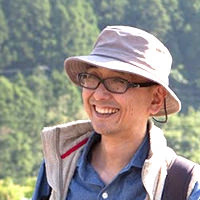
-
西村佳哲さんプロフィール:
建築分野を経て、"つくる・書く・教える"の三種類のお仕事を主軸に活動されている。"つくる" の軸はリビングワールドでのデザインのお仕事、"書く" の軸は『自分の仕事をつくる』をはじめ、働き方、暮らし方、生き方などについて書くお仕事、"教える"の軸ではインタビューのワークショップをメインに、聞き方、関わり方を教えるお仕事をされている。ここ2年ほど、町と立ち上げた「神山つなぐ公社」の仕事にドップリ。
-
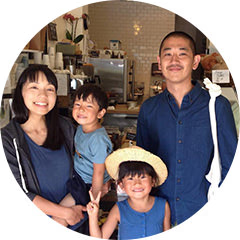
-
真鍋太一プロフィール:
モノサス プロデュース部 部長。広告の制作会社を経て、2012年7月モノサス入社。2014年に仕事で西村さんと再会し、その3月に偶然、西村夫妻と時期を同じく徳島県神山町に移住。東京と徳島の2拠点での活動を開始する。社会とつながり「暮らすように働く」という企業の価値をつくるべく、家族を実験台に検証中。2016年4月より、神山町と西村さんも所属する「神山つなぐ公社」が共同で立ち上げた、「㈱フードハブ・プロジェクト」の支配人(COO)も務める。
「社会的農業」の「社会的」ってなに?
西村さん(以下敬称略)
聞いてみたいなと思ったのは、同じ神山で働いてる真鍋さんの、そのエネルギーはどこから補充しているんだ?という話なんです。その前に、フードハブが言う社会的農業の「社会的」ってどんなことなのか、もう一度教えてもらえますか?
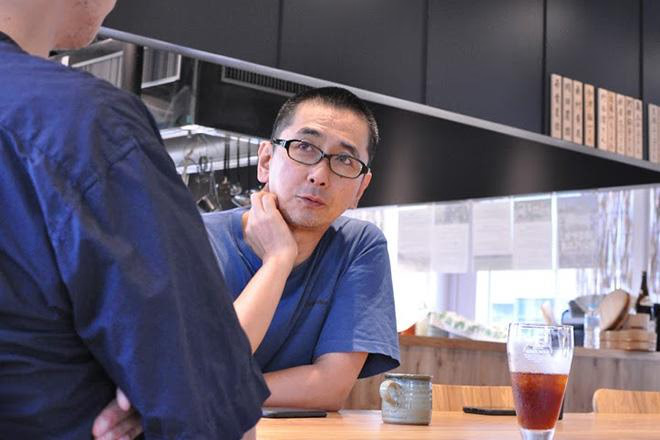
西村佳哲さん
真鍋
自分たちの仕事が社会とつながっているって、当たり前のことだと言えば当たり前なんですよね。農業が社会的であることも当たり前ですし。だけど、そう考えること自体あまりないと思っていて。
そもそも農業って地域に貢献するものだったはず。それをあらためて言うために、わざわざ「社会的」という言葉をつけた感じです。ただの農業をやると言っても、フードハブ・プロジェクト(以下「フードハブ」と略称)のやる農業ってなんなの?となるから、当たり前ですけど「社会的」とつけました。
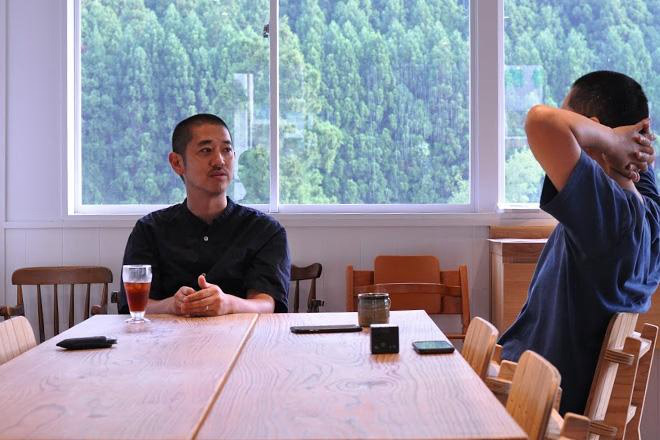
真鍋(左)
西村
すべての仕事が本来的に社会的であると僕も思います。にもかかわらず、あらゆる仕事が「社会的」というよりは「会社的」になってきたなと。つまり会社の中の価値観は非常に内向きで、休み時間に話す話は会社の中の話ばっかりだったりする。社会に対して大きな影響力を持っている会社でさえ、「社会内小社会」だったりするというか。
「社会」と「会社」、字をひっくり返しただけなんだけどね。
いろんな仕事、特に企業の仕事が「社会的」な仕事というよりは「会社的」な仕事になりやすかったり、あるいは競争相手ばかり気にして業界的な仕事になったりというのを、思い出しながら聞いてました。
真鍋
そういう意味では、フードハブって地域のために農業を次の世代につなぐことを目的としていて、それを外に言う時にあえて「社会的」という言葉をつけているのかもしれません。
西村さんの『ひとの居場所をつくる※3』という本に、おじいちゃんが植えた柿の木の柿を孫が食べる、という話で「横のつながりばかり意識して生きてきたけど、これからは縦のつながりを意識して生きていくことが大事じゃないか」というようなことが書かれていましたよね。
我々がやろうとしていることも、横のつながりもあるんだけど、実は「縦のつながりをどうつないでいくか」ということが根幹にあるし、ビジネスでもやっていくつもりで。
それは「会社的」というよりは、「社会的」ということかな?とあらためて思っているところです。
※3西村佳哲 著『ひとの居場所をつくる:ランドスケープ・デザイナー 田瀬理夫さんの話をつうじて』筑摩書房 2013年発行 Amazon
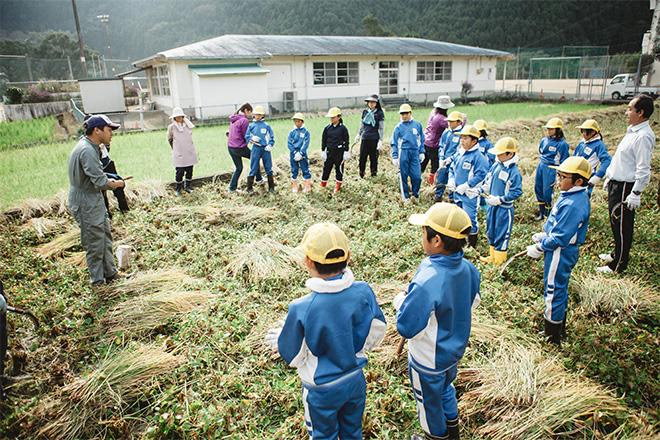
フードハブが神領・広野小学校の生徒たちと一緒におこなっている稲刈りの様子。「地域で育てて、地域で食べる」を子供達につなげる、食育の一環として毎年行われている。
西村
いわゆるソーシャルベンチャーとか、ソーシャルデザインとか、そのあたりの「社会」とは違うってことなの?
真鍋
よく分からないんですよね。何千キロも離れた第3国の人たちを助けるのもいいけど、充分身近で困っているよね、と思っていて。自分は半径何キロかで困っている人の問題を解決していくことの優先順位が高いので、ソーシャルベンチャーとかじゃなくても、やりようがあるというか…。だからフードハブが「社会」と言うときは、そういった意味では言ってないんです。
「仕事に人生をかけない」
向谷地生良さんのはなし
西村
今さ、神山で月どれくらい働いている?
真鍋
月ですか?(笑)東京は4日間くらいで、あとは神山にいますが、休みらしい休みがほんとないですね。でも、ぽこっと抜けて家族のことやったりとか、ちょっと早めに帰って、とかはあるんですけど、時間でいったらまあまあ割いてます。マインドシェアも含めて。
西村
まあ、わたしももっぱら働いていて(笑)。今日はちょっとその辺の話をしたいんだけれども。
あのさ、「べてるの家」※4 に向谷地さんというソーシャルワーカーの人がいてね。ちょっとしばらく話していい?
※4 べてるの家:北海道浦河町にある精神障害をかかえた方たちの活動拠点のこと。向谷地生良さんが代表を務める。
真鍋
どうぞ。
西村
向谷地さんは北海道の浦河町というところで、統合失調を発症した人たち、あるいは精神病を発症した人たちと一緒にいるんだよね。昆布の袋詰めとかの仕事をつくってきてね。浦河って町は行くとね、本当にうらびれた所なんだけれども、べてるが町の重要な要所にもなっている。
その彼を、奈良の「自分の仕事を考える三日間」のフォーラム※5 の2年目のゲストでお呼びしたの。3〜400人の全国から集まった、「よりよく働きたい」という仕事に対して前向きな人たちがいる中で、ゲストと2時間半ずつ話していくわけです。で、2日目の午前中だったかな、ちょうど3日間の峠みたいな時間が向谷地さんだった。
※5 フォーラムの様子は『みんな、どんなふうに働いて生きてゆくの?』(西村佳哲 著 弘文堂 2010年発行 Amazon)にまとめられている。
ゲストにはご自身の話をだいたい30分間くらい語り下ろしてもらって、その話をどう聞いたか話し合ってもらうところからはじめます。向谷地さんは「ソーシャルワーカーの仕事とは」というとこからはじめて、自分がべてるで何をやってきたか聞かせてくれたんですが、その時間がすごくよくて。その最後の5分くらいは、「自分が仕事をする上で大事にしていること」をちょっと話すかという感じで、駆け足で聞かせてくれたんです。
例えば「私は悩み方を工夫してきた。窓際に5年間ほど干されたことがあったけど、そういうときに“悩んでいる”とか考えず、“自分に新しいテーマが生まれた”と捉える」とか(笑)。
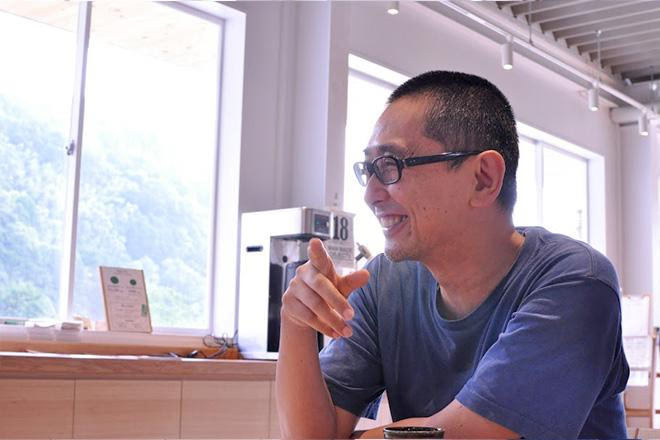
真鍋
悩み方の天才(笑)
西村
僕たちがよく使っている「今日も順調に問題だらけ」という言葉を作ったのも彼。
あとは「ソーシャルワーカーとして人の相談を受ける自分だけど、むしろ周りの人にたくさん相談するようにしている」とか、「生きることと働くことを分けて考えない」とか。みんなうんうんとうなずいているわけです。
ほかにも「弱さの情報交換」とか言っていた。みんな自分の強いところで人と接しようとするけれど、弱いところで接すると、チームがすごく柔らかくなるし温かみがでてくるとか、むっちゃいい話をダダダダダッって言ったあと、最後に「仕事に人生をかけない」と言ったんですよ。
真鍋
(笑)
西村
「時間オーバーしちゃった、すみません、私からは以上です」みたいにザクッと終わっちゃったの。それで、みんななんかこう、ぽんっ、ぽぽぽぽぽんってクエッションマークが立って、「え?今のなに?」みたいな。想像すると「え? 仕事に人生かけたいんですけど…」といった感じだったんじゃないかな。
そのあと、今の話を聞いて3〜4人で15分くらいという時間があって、他のゲストの回だと関を切ったように話しはじめるんだけど、最後のインパクトが大きくて、しばらくシーンとしていたり、後日談だけど外に出て奈良の街を散歩して頭冷やしたとかいう人が何人かいたり。
おれも司会進行役として平静は保ってたんだけど、実はびっくりしてて、「どういうことだろ。わっかんないな」と思っていた。
そのあと何年かかけて、あらためて話を聞く機会もつくって咀嚼したんです。そのときの向谷地さんの話は非常に納得いく話だった。
ソーシャルワーカーとして働いていると、例えば、関わっている統合失調の人が家のガラスを割っちゃってさらに火をつけそうだとか、火事場そのものみたいな場面があると。そんな現場に飛び込んでゆくのだけど、家の中は泥沼で、なんというかその「空気」が自分を侵食してくる感じもある。現場に駆けつけた自分が、結果的にその家族に唾を吐きかけられるようなこともあるんです、という。
人を支援するような仕事ってそういう側面がどうしてもあって、普通は一所懸命働くと、感謝されるとか喜ばれるとか、わかりやすいご褒美があるんだけども、それがもらえないことが往々にしてあるんだと。
だから、自分が働き続けるエネルギーを、その仕事そのものから得ようとしたらだめなんです、という話だったの。
特にソーシャルワーカーの仕事においては、絶対的にそうなんだと。仕事からエネルギーをもらおうとすると枯渇しちゃう可能性があるので、別のところで自立していなきゃいけない。モチベーションも、働いていくエネルギーも、ちゃんと自分で補給していて、そうしないと機能できなくなっちゃう。
支援職ってそういう仕事なんですという風に話してくれて、ああ、そうなのかと、非常によくわかった。
だけど、この向谷地さんの話には、その辺で働いているサラリーマンも同じように照らされる部分があるんじゃないかなと思った。先に話した“基本的に全ての仕事が「社会的」な仕事である”ように、町でパン屋さんを開いた女の子とか、ここで支配人はっている真鍋さんとか、神山つなぐ公社で考え事している私にしても、なんか同じく照らされる部分があるなと思っていてね。
真鍋
照らされるものがあるというのは、どういうことですか?仕事を通じて得られないものがあるというか、唾をかけられることがあるということですか?
西村
彼は「ソーシャルワーカーみたいな支援職は」と話しているけれど、すべての仕事が支援職じゃないか、という気持ちも私にはあるわけ。本来的に。
真鍋
本来的に。
西村
うん。私や真鍋くんについていえば、自分たちがすごい一生懸命頑張っても、なんていうのかな…。褒められるとか感謝されるとか、わかりやすいご褒美が得られるとは限らないんだ、というところが重なってくるなとも思う。少なくとも私は重なるな、というところがあってね。
(後編につづく)
